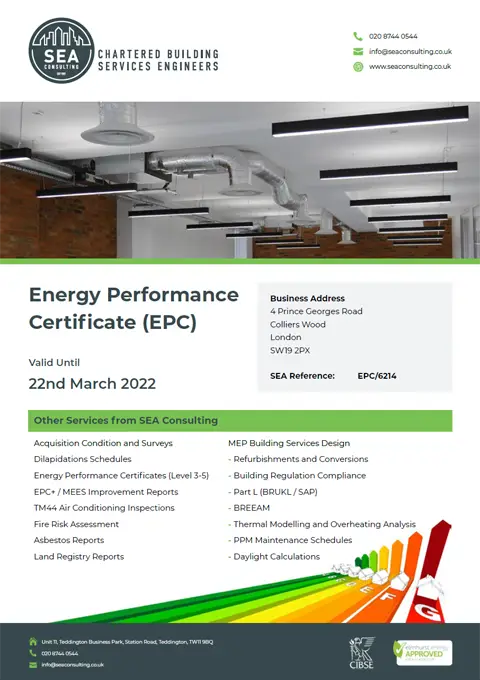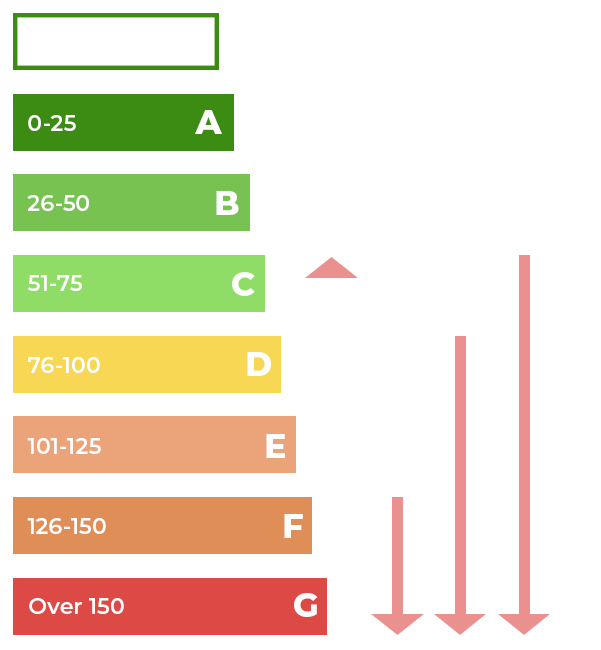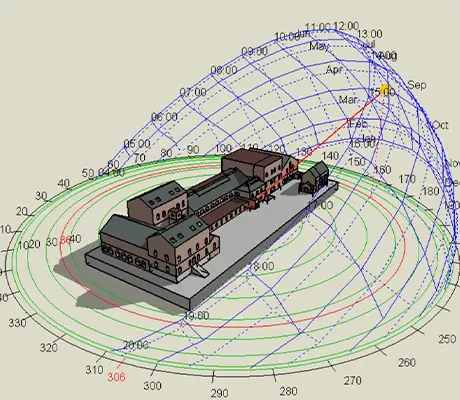EPC Surveys (Level 3-5) and MEES Improvement Reports
Energy Performance Certificates you can trust and actionable MEES improvements Discuss your projectEPC Surveys and MEES Improvement Reports |
EPC Surveys and MEES Improvement Reports
Level 3-5 Commercial Energy Performance Certificates (EPCs)
An Energy Performance Certificate (EPC) rates how energy and carbon efficient a building is on a scale of A to G, with A being the best. The rating acts as a guide to let potential buyers or tenants know how much it will cost to heat.
It is a legal requirement to have a valid EPC for the purposes of selling or letting a building. An EPC is also needed when a building is newly constructed in conjunction with Part L compliance calculations (BRUKL / SAP).
Banks are now requiring a valid EPC as part of their lending terms and most require the property to have a minimum E rating before authorising loans. Landlords of rented properties also need to comply with the Minimum Energy Efficiency Standards (MEES).
At SEA Consulting, we can carry out EPC surveys on all levels of building complexity (Levels 3-5). Our MEP Building Services Engineers have the expertise to understand complex HVAC systems found in large offices and can carry out Level 5 EPCs which are required on more technical and complex buildings, such as those with atriums.
If the property also has air conditioning, then a valid TM44 Air Conditioning Report is also required to sell or let the property.

Minimum Energy Efficiency Standards (MEES)
Landlords of rented properties need to have a valid EPC with a minimum rating of E or above in accordance with the MEES regulations in order to let their property. This also applies to properties with an existing tenant, even where there has been no change in the tenancy arrangements.
The MEES regulations apply to all rented properties where the lease is less than 99 years in length, meaning leasehold properties fall under the regulations.
For commercial properties, the government has proposed a minimum B rating needed in 2030, therefore tightening the regulations.
The exact timeline and legislation is still being finalised by the government. At present, we have been advised to treat the following key dates as if they will become law:
1 April 2025: Landlords must present a valid EPC.
1 April 2027: Minimum C Rating required or have an valid MEES exemption.
1 April 2028: Landlords must present a valid EPC.
1 April 2030: Minimum B Rating required or have a valid MEES exemption.
For residential properties there is currently no plans to tighten the existing MEES requirements further than a minimum E rating.
Expected EPC Regulatory Changes

Currently every commercial property, without a valid excemption, in the UK is required to have an EPC rating of at least E. It’s expected to be a minimum of B by 2030.
EPC+ and MEES Improvement Reports from SEA Consulting
Pressure to improve the energy efficiency of commercial buildings has been increasing. The business case for upgrading property assets has never been stronger.
Many landlords are now seeking to upgrade their buildings EPC Grade to meet the future changes in the MEES legislation to a B in 2030 by reducing the businesses CO2 emissions and future proof their buildings against differential Business Rates. With this in mind, Landlords are needing to know what to do and what it will cost them.
At SEA Consulting, we have extensive experience in helping property owners upgrade their existing property assets in a cost effective manner. We have surveyed thousands of commercial buildings across the UK. With a background in MEP building services engineering, we have an impressive knowledge to give practical advice required to improve a buildings EPC grade and reduce both the running costs and CO2 emissions.

Using sophisticated building modelling software to evaluate the various options available, our team at SEA Consulting is producing bespoke EPC+ / MEES Improvement Reports for our clients. These reports are designed to show landlord/tenants how they can improve the EPC rating. They highlight the financial implications involved and the potential impact to the building’s CO2 emissions and running costs.
If improvement works are to go ahead, our team at SEA Consulting have the resources inhouse to manage these works as MEP Building Services Consultants, either using preferred contractors or creating a performance specification of works for contractors to tender against.
Frequently Asked Questions About Energy Performance Certificates (EPCs)
Who Needs an EPC?
If you want to sell or let your residential or commercial property, you will need to have a valid EPC before the property is placed on the market to inform prospective buyers or tenants about the building’s energy performance. You will need to be able to provide the EPC at the time of exchange of contracts by law.
Landlords of all privately rented properties will need to have a valid EPC rating of E or above in accordance with the MEES regulations.
EPC ratings must be displayed on any marketing material for a property to give potential buyers or tenants an idea of how costly a property will be compared to other properties they may be looking at.
Although the rules are convoluted, a general rule of thumb is that a separate EPC is required on each individual space being sold or let in a single transaction.
Where there is a communal heating system covering a whole building or site, a single EPC may be produced for that space. That EPC may then be used for letting / selling separate parts of the property that are served by the communal system.
What Happens During an EPC Assessment?
Upon instruction, one of our engineers with visit the building to carry out a site survey. The survey investigates the building construction along with the Heating, Lighting and other HVAC services used to condition the occupied space.
Using the information gathered on site, along with researching any relevant technical documentation, a 3D model of the building is created using Government approved software and all the relevant data is inputted.
Using the 3D model, A simulation of the buildings yearly energy demands and associated carbon emissions is then run, which creates the EPC Rating.
The simulation and rating is then lodged on the official Government register at which point the certificate becomes the legal document.
If the rating is not desirable, we can advise how to improve the building and become compliant with the current and future MEES legislation.
Who Can Provide an EPC for My Property?
Only accredited energy assessors can issue EPCs. These professionals undergo training and certification to accurately assess and report on a property’s energy performance.
More complex building such as those with Atrium require a Level 5 assessment. The majority of EPC assessors are not qualified or have the technical expertise to carry out these assessments. At SEA Consulting, our highly knowable engineers are qualified to carry out level 5 assessments.
Luckily for you, SEA Consulting are able to perform EPC surveys from Level 3-5!
How Long is an EPC Valid for?
EPCs are typically valid for 10 years if no major renovations have occured on the building.
If you have an existing EPC, check its expiration date. If it has expired, you’ll need to obtain a new one to comply with regulations.
What's the Penalty for not having the Minimum MEES Rating?
Not achieving the minimum MEES rating for rented properties will leave a landlord liable to enforcement action by Local Weights and Measures Authorities (LWMAs). Depending on how far the breach goes, the authority may impose a financial penalty up to £10,000 or 20% of the rateable value of the property (whichever is greater), up to a maximum penalty of £150,000.
Can There Be More Than One EPC on a Property?
Although the rules are convoluted, a general rule of thumb is that a separate EPC is required on each individual space being sold or let in a single transaction.
Where there is a communal heating system covering a whole building or site, a single EPC may be produced for that property. That EPC may then be used for letting / selling separate parts of the property that are served by the communal system.
If there is an valid EPC for the whole property as well as parts of the property (i.e. first floor), then both EPC are valid, however the EPC can only be used to sell / let the space that is covered by that specific certificate.
If a new EPC is carried out on the whole property or parts of the building, then this will supersede the old EPC, even if the old EPC has not expired.
Does The EPC or MEES Rating Affect Property Value?
Yes. According to a recent report by JLL a single EPC band improvement can increase property value by 3.7% and rental income by 4.2% according to a JLL report.
RICS introduced the Sustainability and Commercial Property Valuation Paper in 2009. This requires all RICS valuers to factor in sustainability performance to their asset valuations. There is increasing evidence that buildings with a better energy performance should be valued higher than those that do not.
With energy costs at record highs and continuing to rise, tenants are becoming more aware of the importance of running costs to their bottom line. As the EPC is meant to give an indication of the energy efficiency and carbon emissions, the rating is becoming a more important factor in their decision process.
With the future of the MEES legislation looking to tighten to a minimum B rating in 2030 for commercial properties, potential new owners are taking improvement costs into account when it comes to the potential asset value and are adjusting their offers to suit.
Investment funds are one of the largest investors in commercial property. As part of their annual ESG reporting and SECR reports, they need to disclosed their overall carbon emissions. With EPCs measuring the CO2 emissions of a property they are being used as part of their reporting strategy and are trying to improve the EPC rating of their portfolios.
Does The EPC or MEES Affect Mortgages and Financing?
Yes. With MEES now in affect, lenders are now making the EPC rating part of the finance terms to reduce their risks. At present most lenders are requiring a minimum E rating on properties in line with the current MEES regulations, which is having an impact on asset valuations.
Some lenders will now only lend on assets graded C or above and others will not lend on assets that are F or G rated, unless there is a robust improvement plan in place.
With the MEES regulations looking to tighten to a minimum B rating in 2030, they will adjust their lending terms to reflect this change in regulations.
Can A Tenant Use The EPC or MEES to Get Out of a Lease or Not Pay Charges?
In theory if a lease was signed without a valid EPC, it is potentially not a valid contract.
Can a Tenant Use The EPC or MEES to Reduce Dilapidation Costs?
Yes, if reverting the property to its original fit out would drop the EPC rating below the mimimum MEES requirements.
As an example: SEA Consulting were hired by a tenant to help reduce their £4M dilapidations claim on a 91,000 sq.ft property. Reverting the property back to the original fit out would have dropped the EPC rating below the minimum MEES requirements, thus making the property unlettable for the landlord. We successfully helped challenge the claim in court to reduce the tenants dilapidation costs to £1M. It is therefore important that landlords improve the rating to meet the future regulations.
Does The EPC Affect Business Rates?
A significant percentage of the UKs building stock now has an Energy Performance Certificate (EPC) grade. All of this information sits on a government database. Although not confirmed, there is increasing expectation that the Government will introduce differential Business Rates based on a building’s EPC Rating.
What is an Energy Performance Certificate (EPC)?
An Energy Performance Certificate (EPC) is a document that assesses the energy efficiency of a property. It provides information about the property’s energy use, carbon emissions, and offers recommendations to improve efficiency.
Why do I Need an EPC for My Property?
EPCs are a legal requirement for most properties when they are sold, rented, or constructed. They help potential buyers and tenants understand the energy efficiency of a property, making informed decisions.
How is the Energy Efficiency of a Property Measured?
nergy efficiency is measured on a scale from A to G, with A being the most energy-efficient and G being the least. The certificate includes ratings for the current energy efficiency and potential improvements.
When is the Best Time to Obtain an EPC?
It’s advisable to obtain an EPC as early as possible in the property transaction process. This allows potential buyers or tenants to consider energy efficiency alongside other factors when making decisions.
What Happens During an EPC Assessment?
During an assessment, an accredited energy assessor will evaluate various aspects of your property, including insulation, heating systems, and lighting. The data collected is used to generate the EPC.
Can an EPC Improve the Value of My Property?
While an EPC itself may not directly impact property value, having a high energy efficiency rating can make your property more attractive to eco-conscious buyers or tenants, potentially influencing its market value.
Are There Grants Available for Energy Efficiency Improvements?
In some cases, there are government grants and incentives available to support energy efficiency improvements. Check with local authorities or energy efficiency programs for the latest information.
What Should I Do if My Property Has a Low EPC Rating?
If your property has a low energy efficiency rating, the EPC will include recommendations for improvement. Consider implementing these suggestions to enhance energy performance and reduce operating costs.
